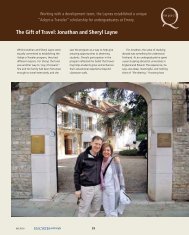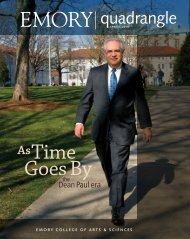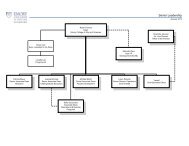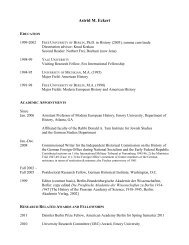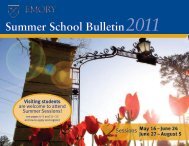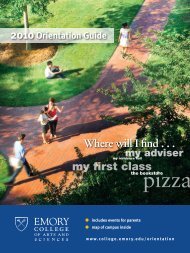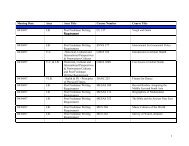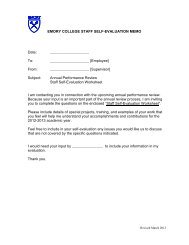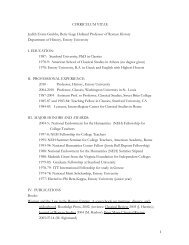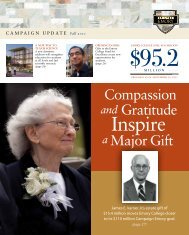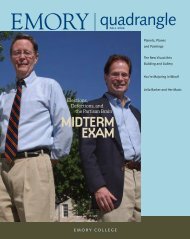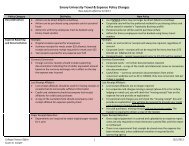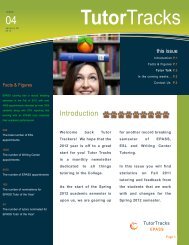2012 Summer School Bulletin - Emory College - Emory University
2012 Summer School Bulletin - Emory College - Emory University
2012 Summer School Bulletin - Emory College - Emory University
Create successful ePaper yourself
Turn your PDF publications into a flip-book with our unique Google optimized e-Paper software.
environmental influences on behavior, aggression, courtship and mating strategies, parental<br />
behavior foraging, predator-prey relationships, and social organization.<br />
323-00A. DRUGS AND BEHAVIOR<br />
10:00 a .m .–11:20 a .m . Daily . 1st session . Credit, 4 hrs . Neill<br />
First-year students cannot take this course. This course is a survey of the neurobehavioral<br />
effects of the various classes of psychoactive drugs, e.g., stimulants, tranquilizers,<br />
hallucinogens, etc. Although human experience is taken as the starting point of each drug<br />
effect covered, most of the experimental data presented are concerned with attempts<br />
to understand behavioral drug effects using nonhuman animal models. A fundamental<br />
idea is that by understanding the brain mechanisms through which psychoactive drugs<br />
exert their effects, we can understand the brain mechanisms of pain, perception, anxiety,<br />
schizophrenia, depression, etc.<br />
330-00A. PERSONALITY THEORIES<br />
10:00–11:20 a .m . Daily . 1st session . Credit, 4 hrs . Carter<br />
This is a survey course covering psychological theory, history, and research in the area of<br />
personality. Topics such as controversies in the field of personality assessment, cognitive<br />
and biological influences on personality, genetics and personality, and gender differences<br />
in personality will be covered.<br />
415S-00A. SLEEP AND DREAMING<br />
2:30–4:45 p .m . MWF . 1st session . Credit, 4 hrs . Rodman<br />
Prerequisites: Psych 110 or 103 or Bio 141/142 or other equivalent introductory<br />
biopsychology background, plus at least one additional course in any area of psychology,<br />
NBB, anthropology, or philosophy. Not for S/U. This course focuses on the neural<br />
mechanisms and phenomenology of sleep as a basis for discussing its implications for<br />
behavior, emotion, cognition, evolution, and related philosophical issues. Specific topics<br />
to be addressed include the neurobiology of sleep, the role of sleep in memory and other<br />
Course Number Key and Dates<br />
00A: First session May 21 – June 29 00F: Miscellaneous Varies<br />
00B: Entire summer May 21 – August 10 0PA, 0PB, 0PC Permission required<br />
00C: Second Session July 2 – August 10<br />
MAY: Maymester May 15–June 1<br />
cognitive phenomena, theories of dreaming, relationships between sleep, mood, and other<br />
drives and conditions, individual and species differences in sleep behavior, lucid dreaming<br />
and other subjective components of dream experience, and sleep as a model for studying<br />
states of consciousness.<br />
475-MAY. PERSONALITY AND CREATIVITY<br />
9:00 a .m .–12:30 p .m . Daily . Maymester, Credit, 4 hrs . Duke<br />
Is there a relationship between madness and creativity? Between personality and creativity?<br />
Are there such things are creative people versus non-creative people? Does a person<br />
need to have psychological pain or a troubled life in order to generate great art, music,<br />
literature, or dance? Early versions of this latter idea can be found in writings about the<br />
Saturnine hypothesis during the Renaissance where it was believed that those born under<br />
the sign of Saturn (melancholics) were more creative. This notion has lived on into the<br />
21st century, but in more modern form. Must creative people be bipolar or strung out on<br />
drugs? Is it necessary to take a bullet in order to be a hip-hop sensation? But there are other<br />
questions. What about creativity in plain old normal people? Is creativity limited only to<br />
the arts? Does it play a role in business success? Science? Politics? Is creativity in nonartistic<br />
domains the same as it is in the arts? Does the Saturnine hypothesis remain in force? In this<br />
seminar we will examine these and other questions through examination of the lives and<br />
works of creative people—writers, singers, dancers, painters, sculptors, business people,<br />
scientists, world leaders and politicians. You will also have a chance to express your own<br />
creativity in the form of a final “creation” that represents your “answer” to the question<br />
of the relationship between personality and creativity. Required text: Creativity, M.<br />
Csikszentmihalyi. Readings will also be provided in class or online.<br />
498R-00B. DIRECTED READING<br />
Both sessions . Variable credit, 1–12 hrs . Faculty<br />
Prerequisite: Psychology majors only; permission is required prior to enrollment. Students<br />
must have consent of faculty member and agreement on a topic. Students are required to<br />
complete a contract with regular faculty member detailing their research. A list of regular<br />
faculty members of the psychology department who are eligible to supervise may be found<br />
on the back of the contract form. Only faculty members whose names are on this list<br />
<strong>Summer</strong> <strong>School</strong> <strong>Bulletin</strong> Courses | 33 www.college.emory.edu/summer



